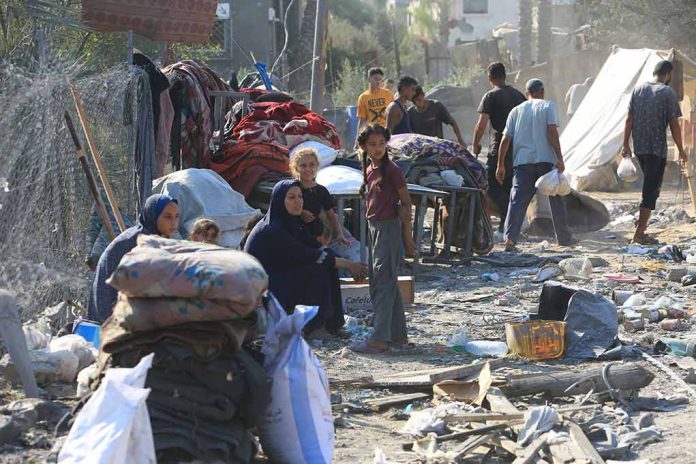
Hamas seizes humanitarian aid trucks in Gaza, raising ethical concerns and strategic challenges for aid distribution in the ongoing conflict.
At a Glance
- Hamas has taken control of 47 out of 100 humanitarian aid trucks entering Gaza
- The seizure raises ethical questions and challenges for aid distribution
- Israeli Defense Forces are working to counteract these unauthorized appropriations
- International diplomacy, including the Biden administration, urges continued aid flow
- The situation presents complex dilemmas regarding humanitarian support in conflict zones
Hamas’s Control Over Aid Distribution
Recent reports indicate that Hamas has seized control of nearly half of the humanitarian aid trucks entering Gaza, sparking global concern. This development highlights the terrorist group’s ongoing efforts to dominate local resources, bolstering its authority and finances at the expense of civilian well-being. The Israeli Defense Forces are actively working to prevent these unauthorized appropriations, but the task remains challenging given the complex situation on the ground.
Hamas’s control over aid distribution extends beyond simply intercepting trucks. According to intercepted communications, the terrorist organization is now struggling with storage capacity due to the sheer volume of confiscated goods. This revelation underscores the extent of Hamas’s interference with humanitarian efforts and its disregard for the urgent needs of Gaza’s civilian population.
Impact on Civilian Population
The humanitarian situation in Gaza has reached critical levels, with 1.8 million residents suffering due to the actions of their leaders, particularly Hamas. The terrorist group’s prioritization of its goal to destroy Israel over meeting the basic needs of Palestinians has led to a dire situation for civilians. Hamas’s diversion of international aid to build terror tunnels and rocket factories has not only harmed ordinary Palestinians but also discouraged future assistance efforts.
Despite Hamas’s actions, Israel continues to provide humanitarian aid, including construction materials and fuel, to Gaza. However, Hamas’s theft of fuel intended for electricity production exacerbates civilian shortages, further complicating the already challenging situation.
International Response and Challenges
The international community, including the United States, faces a complex dilemma in addressing the humanitarian crisis in Gaza. While there is a strong desire to provide aid to civilians in need, concerns about Hamas’s misappropriation of resources complicate these efforts. The U.S. Agency for International Development (USAID) and the State Department’s refugees bureau have raised alarms about the deliberate blocking of humanitarian aid, leading to calls for a reassessment of arms sales to Israel.
However, the Biden administration has not accepted these findings, maintaining its support for Israel while attempting to balance humanitarian concerns. The situation highlights the challenges of providing aid in conflict zones, where ensuring that assistance reaches its intended recipients becomes increasingly difficult.
Conclusion
The seizure of humanitarian aid trucks by Hamas in Gaza presents a multifaceted challenge for the international community. While the need for aid remains critical, the ethical implications of potentially supporting a terrorist organization through misdirected assistance cannot be ignored. As the conflict continues, finding a balance between providing necessary humanitarian support and preventing the exploitation of aid by Hamas will remain a pressing concern for all parties involved.
Moving forward, increased scrutiny and innovative approaches to aid distribution may be necessary to ensure that humanitarian assistance reaches Gaza’s civilian population without inadvertently strengthening Hamas’s position. The international community must remain vigilant and adaptive in its efforts to address this complex humanitarian crisis.













